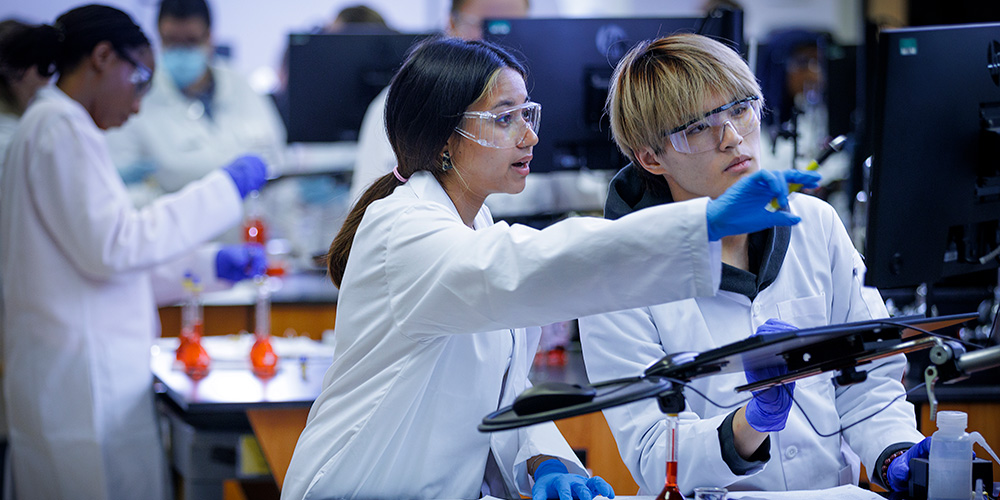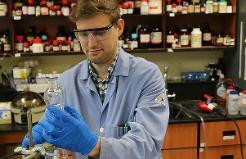Chemistry Program

Why study Chemistry?
Chemistry is the study of matter, including its properties and composition, and of the changes it can undergo. The many different fields of Chemistry include its core areas: analytical, biochemistry, inorganic, organic, physical and theoretical.
Working in pairs in the lab right away means you’ll quickly meet people in your first year. Class sizes are rarely larger than 25 students, so professors and students alike can get to know you well in this friendly and inspiring learning environment.
The Saint Mary’s approach
As a chemistry major, you’ll receive instruction in each of the core fields and courses such as green chemistry and environmental chemistry. This will give you a solid foundation in chemistry and the skills and knowledge to address real-world, contemporary issues.
Our program is nationally accredited by the Chemical Institute of Canada. This means we meet their national education standards, and they promote the qualifications of our BSc Chemistry students.
Hands-on learning
Our professors rely on undergraduate research assistants to help carry out their projects. These paid positions are extremely valuable in providing hands-on learning opportunities. Our students have authored research papers and regularly present talks and travel to local, national, and international conferences.
Sample courses offered:
- Physical Chemistry: Study the underlying physical principles that govern the properties and behaviour of chemical systems from a macroscopic viewpoint. Topics include thermodynamic laws, work, heat, enthalpy, entropy, Carnot cycle, free energy, phase equilibrium, phase diagrams of pure substances and simple mixtures, and chemical potentials.
- Green Chemistry: Green chemistry, or environmentally benign chemistry, is the design of chemical products and processes that reduce or eliminate the use and generation of hazardous substances. This course will examine the chemical principles and processes in the development of technology and in the effects that this technology has on the environment. The course will avoid traditional approaches that only consider the treatment of pollution after it was created, and will focus on alternative routes that limit the production of waste.
- Instrumental Analysis: Examine advanced aspects of instrumental analysis including (i) an introduction to chemical separations; (ii) separation techniques including high-performance liquid chromatography and gas chromatography; iii) additional separations methods including capillary electrophoresis; and (iv) hyphenated techniques with organic mass spectrometry and additional topics at the discretion of the instructor.
- Introductory Biochemistry: This course reviews and/or presents an introduction to the chemistry and biochemistry of macromolecules such as proteins, enzymes, simple and complex carbohydrates, lipids, nucleic acids, and coenzymes. A relationship between the molecular structure of a given macromolecule, its properties, and its function in the living system is explored. The laboratory work concentrates on the isolation, purification, and analysis of naturally occurring macromolecules and includes study of their properties, using micro chemical measurements.
Future career opportunities:
- Lab technician
- Art conservation scientist
- Chemical patent lawyer
- Environmental policy maker
- Health Professional
Discovering hidden talents

Kyle Awalt, who graduated in 2017 with a BSc in Honours Chemistry, received a prestigious scholarship to pursue a PhD in Medicinal Chemistry at the University of Monash in Melbourne, Australia. Kyle credits his success with the opportunities he gained as a research assistant in Dr. Singer’s green chemistry lab, where he worked as an undergraduate.
“My success has been driven by the paper I published and my work in Dr. Singer’s lab,” says Kyle. “I don’t think I would have had the same level of opportunity as an undergraduate at a larger school.”